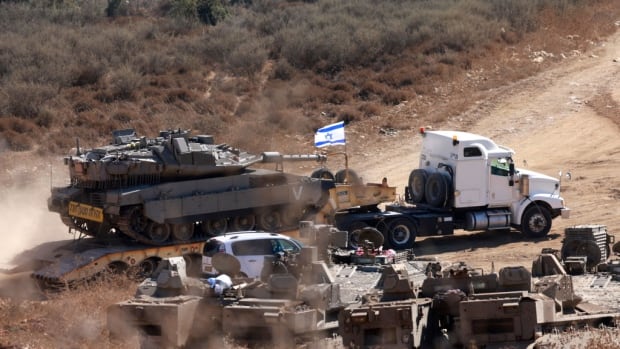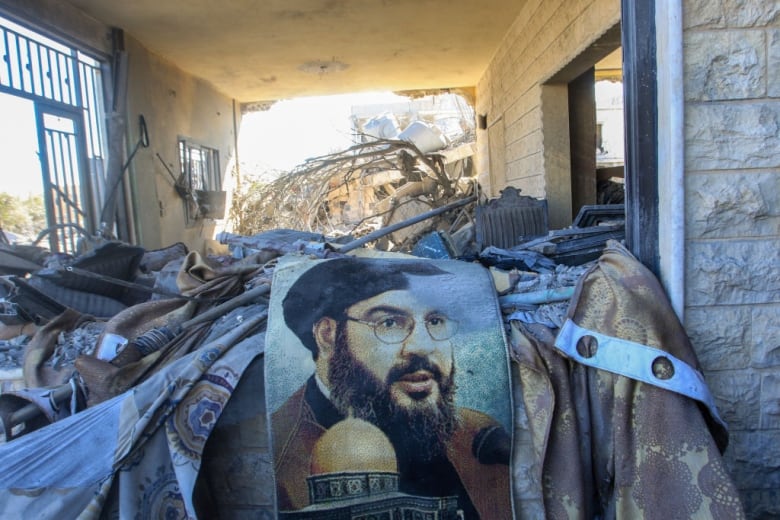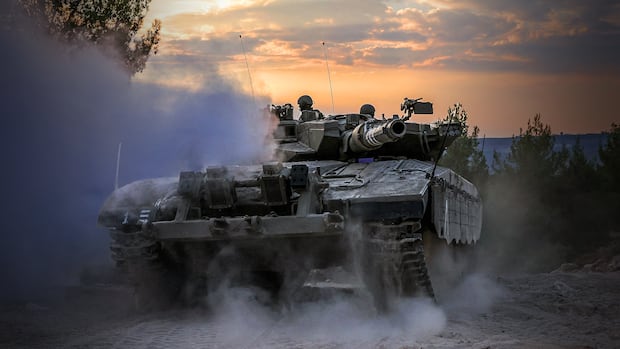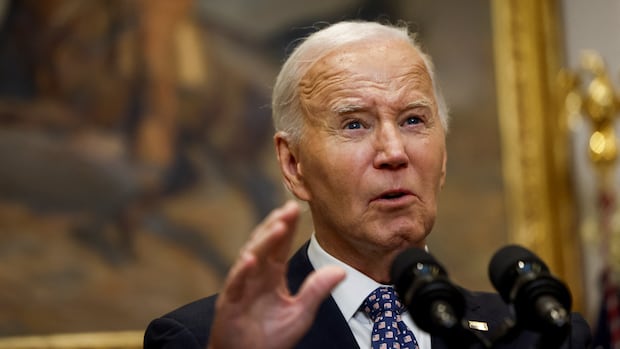
Israel’s widely expected ground invasion of Lebanon appeared to be getting underway early on Tuesday as its military said troops had begun “limited” raids against Hezbollah targets in the border area.
The Israel Defence Forces (IDF) said in a statement on Telegram that its targets were located in villages close to the border that posed “an immediate threat to Israeli communities in northern Israel.” It said the air force and artillery were supporting ground forces with “precise strikes.”
“The IDF is continuing to operate to achieve the goals of the war and is doing everything necessary to defend the citizens of Israel and return the citizens of northern Israel to their homes,” the statement said.
Local residents in the Lebanese border town of Aita al-Shaab reported heavy shelling and the sound of helicopters and drones overhead.
As tensions grow along Israel’s northern border with Lebanon, a top Israeli military official says troops are preparing for a potential ground invasion targeting Hezbollah military outposts. Andrew Chang explains what a full-scale invasion would look like and why many world leaders are fearing the worst.
Images supplied by Getty Images and Reuters.
About 60,000 people have been evacuated from northern Israel because of near-daily attacks by the Iran-backed group that began after Hamas-led militants from Gaza launched their deadly attacks on southern Israel nearly a year ago.
A Lebanese security source told Reuters Monday that troops had pulled back from positions along Lebanon’s southern border with Israel to about five kilometres north of the border.
Amal Al-Hourani, mayor of Jdeidet Marjayoun, a Christian-majority Lebanese village less than 10 km from the border, told Reuters that two locals had received calls apparently from the Israeli army telling them to evacuate the area as soon as possible.

The Israeli military declared the areas around the communities of Metula, Misgav Am and Kfar Giladi in northern Israel near the border with Lebanon as a closed military zone and said entry to the areas was prohibited.
Israeli airstrikes on targets in Beirut and elsewhere in Lebanon continued, extending a two-week-long wave of attacks that has eliminated several Hezbollah commanders, including Nasrallah, the group’s veteran chief, on Sept. 27.
Canadians told to leave Lebanon
Nasrallah’s killing, along with the series of attacks against the group’s communications devices, constitute the biggest blow to Hezbollah since Iran created it in 1982 to fight Israel.
Airstrikes have also killed around 1,000 Lebanese and forced one million to flee their homes, according to officials in Lebanon. On the weekend, the UN high commissioner for refugees said more than 200,000 have been displaced inside Lebanon.
Global Affairs Canada last week said two Canadians had died in Lebanon amid the hostilities. Global Affairs Minister Mélanie Joly has also said Ottawa is booking seats on commercial flights to help Canadians get out of Lebanon.
U.S. President Joe Biden, who held a press briefing about the aftermath of Hurricane Helene on Monday, took a question about escalating tensions in the Middle East and the possibility that Israel’s military might launch a limited operation inside Lebanon.
In a statement posted Monday on social media platform X, Joly said Canada has secured an additional 800 seats over the next three days.
“If you are a Canadian citizen in Lebanon, you must leave now,” the post read. “If you are offered a seat, take it now.”
As It Happens6:55Calgary man heads to Lebanon to bring his family home
As scores of people in Lebanon were fleeing their homes, Youssef Mustafah Saleh headed towards the danger. The Calgary resident flew to the country this weekend, amid escalating violence with Israel, to reunite with his wife and five children. Now he’s trying to figure out how to get them safely back to Canada. He spoke to As It Happens host Nil Kӧksal from Lebanon’s Bekaa Valley.
Israel had told the United States about a number of operations, the State Department said on Monday.
When asked if he knew anything about plans for a “limited operation into Lebanon,” U.S. President Joe Biden on Monday said, “I am more aware than you might know and I’m comfortable with them stopping. We should have a ceasefire now.”
The Pentagon said Monday the U.S. is sending a “few thousand” troops to the Middle East to bolster security and to defend Israel if necessary. The additional forces would raise the total number of troops in the region to as many as 43,000.
Hezbollah says it’s ready for land invasion
Hezbollah’s deputy secretary general, Naim Qassem, said on Monday his group would appoint a new leader at the earliest opportunity to replace Nasrallah and vowed that the Iran-backed organization would continue fighting Israel.
“The Islamic resistance will continue to confront the Israeli enemy in support of Gaza and Palestine, in defence of Lebanon and its people, and in response to assassinations and the killing of civilians,” he said.
Qassem said Hezbollah’s fighters had continued to fire rockets as deep as 150 kilometres into Israeli territory and were ready to face any possible Israeli ground incursion.
As It Happens6:44‘Thank God we’re not hit yet,’ says resident of Israeli kibbutz near Lebanon border
Hezbollah has vowed to send more rockets into northern Israel in the wake of Israel’s assassination of its leader, Hassan Nasrallah. Daniella Porat Penso is a resident of Yiftah, an Israeli community about a kilometre away from the Lebanese border. She spoke to As It Happens host Nil Kӧksal about life within earshot of the explosions — and why she believes war is not the answer.
France, Britain, UN urge restraint
French Foreign Affairs Minister Jean-Noel Barrot had urged Israel on Monday not to undertake any ground invasion of Lebanon, saying France will step up its support for the Lebanese army.
British Foreign Minister David Lammy repeated calls for an immediate ceasefire amid reports of a potential escalation in the Israel-Lebanon conflict, after discussing the matter with U.S. Secretary of State Antony Blinken over the phone on Monday.
“We both agreed the position that we had at the UN last week that the best way forward is an immediate ceasefire and to get back to a political solution,” Lammy told Sky News.
Israel last week rejected a proposal by the U.S. and France calling for a 21-day ceasefire to give time for a diplomatic settlement that would allow displaced civilians on both sides to return home.
In the early hours of Monday, an Israeli strike in central Beirut claimed the lives of three members of the Popular Front for the Liberation of Palestine, a small leftist faction of the Palestine Liberation Organization.
When a CBC News crew visited the site in the Kola district, debris and personal belongings were strewn around an underpass across the street from the apartment building that was hit. Part of the sidewalk appeared to be smeared with blood.
Jamal Hussein, 66, a resident of the area, was sitting on a plastic lawn chair near the site and told CBC News that he heard the explosion overnight.
He said it’s been too loud to sleep, with Israeli airstrikes targeting the city night after night, and that he is frustrated with the recent escalation of hostilities.
The area, which is predominantly Sunni, is usually busy, but the military was keeping people out Monday.
The building that was hit had clear structural damage, and some locals said they were told that there was still an unexploded missile inside. In mid-afternoon, a drone could be seen flying high overhead.
Hamas commander killed in Monday strike
In the southern coastal city of Tyre, Monday’s early morning strikes also killed a Hamas commander who had worked for the Palestinian relief agency UNRWA, The Associated Press reported.
Hamas confirmed Fatah Sharif Abu Al-Amine was killed along with his wife, son and daughter in an airstrike on Al-Buss refugee camp, one of 12 dedicated to Palestinian refugees in Lebanon. The Israeli military confirmed it had targeted him.
UNRWA said Sharif had been suspended since allegations of his ties to Hamas emerged in March. The agency’s commissioner-general, Philippe Lazzarini, said he learned then that Sharif had been a “member of the political party of Hamas” and decided to suspend him and launch an investigation “from Day 1.” He said he hadn’t heard Sharif might be a Hamas commander until Monday.
“So, he was suspended, had no function, was not paid and was under investigation,” Lazzarini told reporters in Geneva. “We are still an agency with due process.”

